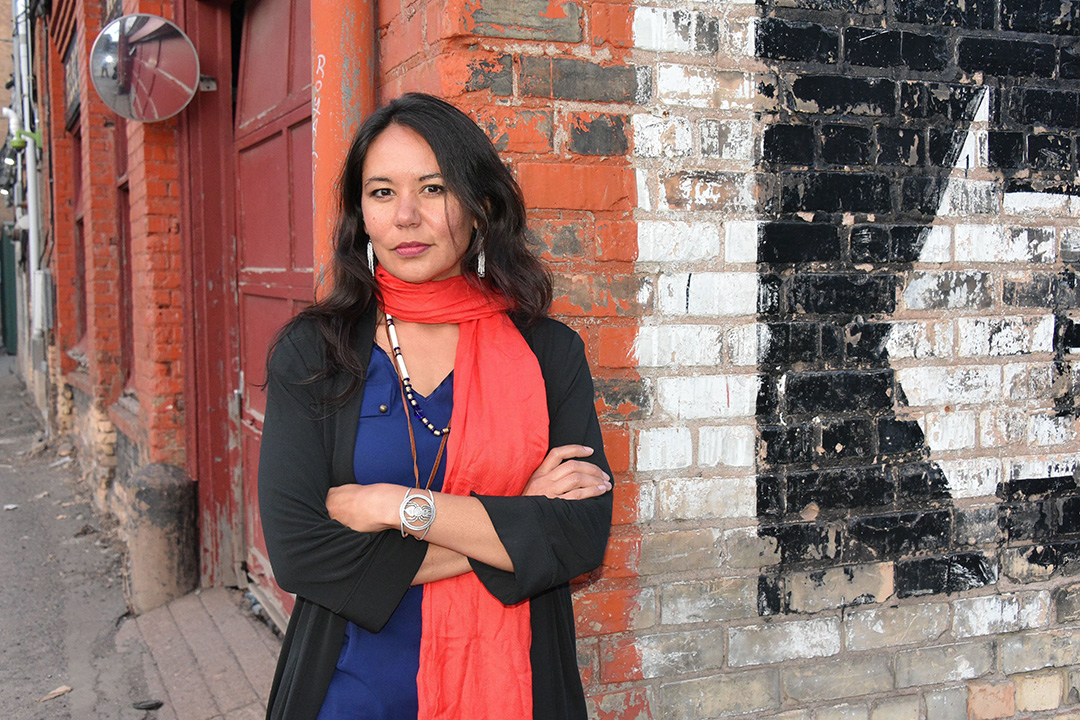
USask researcher focuses work on land-based healing
The commitment to Indigenization and decolonization demonstrated at the University of Saskatchewan (USask) is important to Dr. Michelle Aihina Inkinsh Holhpokunna Johnson-Jennings (PhD).
By SHANNON BOKLASCHUKIn fact, it’s one of the things that helped bring the respected scholar to her current faculty position in USask’s College of Arts and Science in January 2018.
“What really drew me to the University of Saskatchewan was the ability to focus on my Indigenous research, while working with a great group of Indigenous students and colleagues focused on Indigenous research as well,” said Johnson-Jennings.
“I sing the university’s praises to almost everyone I speak to, especially when I travel to the U.S. While the university says that we are focused on Indigenizing and decolonizing, I can really see change occurring across administration, faculty, students and staff. Of course, it’s not perfect; we’re engaging in the process. But, at the same time, it’s really the most energy and focus that I have seen at any other university across North America, in particular, and I’d say, even with my limited experiences, across the globe.”
Johnson-Jennings, an associate professor in the Department of Indigenous Studies, was recruited from the University of Minnesota, where she served as the founder and director of the Research for Indigenous Community Health (RICH) Center. She came to USask after completing a U.S. Fulbright Scholar award that enabled her to conduct research at the University of Waikato in New Zealand. Along with her husband Dr. Derek Jennings (PhD), a faculty member in the Department of Community Health and Epidemiology in USask’s College of Medicine, she co-hosted a delegation of Maori scholars and artists from New Zealand who visited Saskatchewan in August 2018.
A member of the Choctaw Nation, Johnson-Jennings is a licence-eligible clinical health psychologist who earned a master’s degree at Harvard University and a PhD from the University of Wisconsin-Madison. In 2019, she was named a Canada Research Chair in Indigenous Community-Engaged Research and is recognized as one of the few Indigenous psychologists focused on healing interventions on the land.
Johnson-Jennings has witnessed firsthand how connecting with the outdoors can reduce addiction and obesity rates and improve overall health and well-being. She’s seen some communities experience “remarkable changes” as a result, such as implementing healthy eating practices and promoting gardening and hiking. In this vein, she is currently working on a project funded by the Canada Foundation for Innovation that involves developing a Canadian digital repository for Indigenous knowledge around food, known as the Food the Original Obesity Deterrent (FOOD) project.
As a psychologist, Johnson-Jennings employs a narrative reactive therapy framework in her work. This involves re-examining trauma by focusing on the strength the person had to help carry them through the difficult time.
“The work I do focuses more on addressing historical trauma while partnering with Indigenous communities,” Johnson-Jennings explained. “It’s been really driven by them; it’s not necessarily something I set out to do. But Indigenous communities have said, time and time again, that they want to address historical trauma because they believe it affects their health and well-being today.”
Since coming to USask, Johnson-Jennings has had numerous opportunities to explore her interests in Indigenous health and land-based healing. In 2019, a $3.5-million grant from the Canadian Institutes of Health Research (CIHR) was awarded to USask researchers to establish an Indigenous-led centre to address the increase in HIV, Hepatitis C and other sexually transmitted infections among Indigenous people in Saskatchewan and Manitoba. Johnson-Jennings has taken on a lead role with the new centre, known as Wuniska, which is under development.
“This is really exciting, because in all of our projects we do have a land-based healing component,” she said.
Johnson-Jennings is also a co-lead investigator with another USask research team that was awarded $1.2 million from CIHR in 2019. The researchers will examine the benefits of keeping babies born in withdrawal from opioids with their mothers in a supportive care home environment such as Sanctum 1.5—Canada’s first HIV and high-risk pre-and postnatal care home for women living with HIV or at risk of transmission of HIV.
“I’m so excited about that project because it’s really about determining the benefits of women keeping their babies with them, creating strong bonds and nourishing that, while simultaneously reducing other health risks for both mom and baby,” said Johnson-Jennings, a proud mother of four children.
In addition, in collaboration with the University of Waikato, Johnson-Jennings is part of the Working to End Racial Oppression (WERO) project that recently received funding of $10 million NZD. Johnson-Jennings is addressing the issue of systemic racism in health, in partnership with Maori psychologists and Dr. Jeffrey Asloos (PhD) from the University of Toronto.
When engaging with Indigenous communities, Johnson-Jennings sees her role as a facilitator rather than as an expert. She promotes what she calls “health leaders,” a concept that encourages community members to reflect on the strength and wisdom of their ancestors and develop a sense of responsibility for the well-being of future generations.

